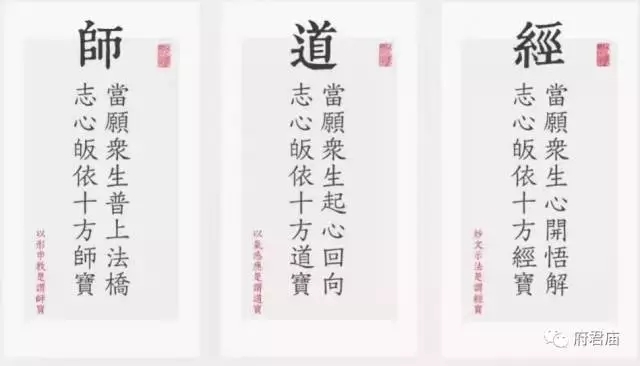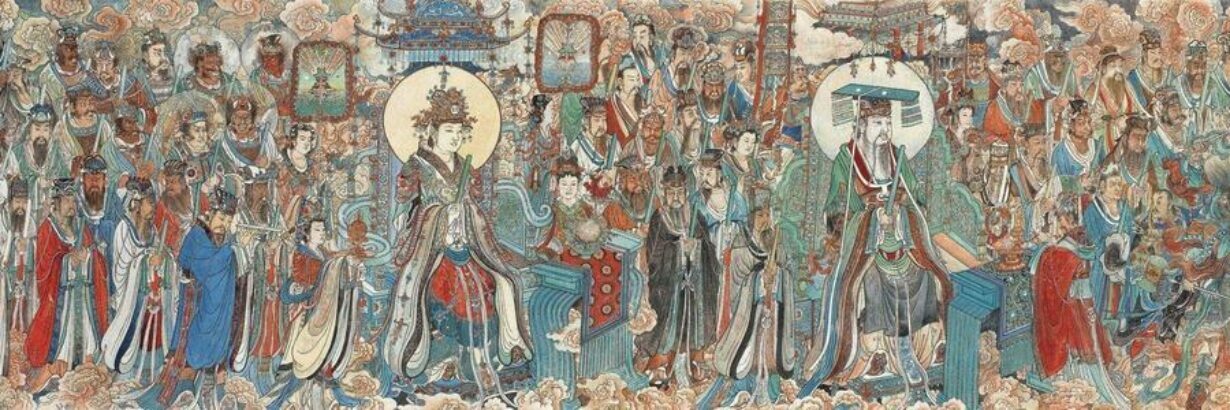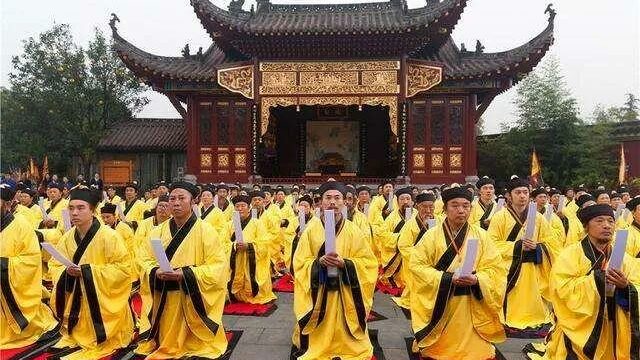Three Refuges – 三皈
“The Three Refuges and Five Precepts are the most fundamental precepts in Taoism that beginners (whether ordained or lay practitioners) must first adhere to. The ‘Initial True Precepts’ state: ‘For those who are new to the authentic teachings of the Supreme Oneness, regardless of worldly or spiritual matters, they must first abide by the Supreme Golden Precepts, the Three Caverns’ precepts, and make offerings to the venerable image of the Great Tao. They should communicate with the Heavenly Officials and seek their approval, request a pledge and certification, and receive the Three Refuges Precepts.’
第一皈身,太上无极大道。永脱轮回,故曰道宝
The First Refuge is the Refuge of the Body, to the Supreme Infinite Great Tao. It signifies eternal liberation from the cycle of birth and death, thus called the Treasure of the Tao.
第二皈神,三十六部尊经。得闻正法,故曰经宝
The Second Refuge is the Refuge of the Spirit, to the thirty-six revered scriptures. It signifies attaining the hearing of the authentic teachings, thus called the Treasure of the Scriptures.
第三皈命,玄中大法师。不落邪见,故曰师宝
The Third Refuge is the Refuge of the Life, to the Great Master of the Profound Center. It signifies not falling into wrong views, thus called the Treasure of the Master.”

Five Precepts – 五戒
Also know as “Five Precepts for Accumulating Merit and Returning to the Source”
“The Taoist tradition stipulates that the Five Precepts correspond to the celestial realm as the Five Constellations. When the celestial order loses adherence to these precepts, calamities and abnormalities manifest. On Earth, they correspond to the Five Sacred Mountains. When the earthly order loses adherence to these precepts, crops fail to grow. In numerology, they correspond to the Five Elements. When the harmony of these numbers is disrupted, water and fire clash, and metal and wood harm each other. In governance, they correspond to the Five Emperors. When the rulers fail to uphold these precepts, their reigns are short-lived, and they meet premature deaths. In human beings, they correspond to the Five Organs. When these organs lose adherence to the precepts, one’s nature becomes deranged. The founder of Taoism said, ‘If one of these Five Precepts is violated, one’s destiny cannot be fulfilled. Therefore, abstaining from killing means even the absence of a mind inclined towards killing. Not stealing means even the absence of covetous thoughts. Not indulging in lust means even the absence of impure thoughts. Abstaining from alcohol means even the absence of violence. Not speaking falsely means even the absence of leaks of confidential information. This can be considered as achieving the precepts.’ He further said, ‘Those who sincerely follow the Tao, whether in household or monastic life, should uphold the Five Precepts, dedicating their entire bodies and lives without violating them. Moreover, they should diligently recite the Tao Te Ching day and night, seeking the profound meanings within its verses, practicing austerity and making progress, cultivating benevolence and compassion, selflessly helping others, and thus they can achieve truth, attain the Tao, and become enlightened.'”
五戒 Five Precepts
- Must not kill一者不得杀生
- Must not harm others二者不得损人利己
- Don´t be insincere三者不得口是心非
- Must not steal四者不得偷盗
- Must not be evil五者不得邪淫

Ten Virtuous Deeds – 十善
“Taoism believes that by consistently practicing the Five Precepts and Ten Virtuous Deeds, individuals receive the benevolent protection and blessings of celestial beings, resulting in the eradication of calamities and the attainment of lasting blessings. These Five Precepts serve as the fundamental guidelines for accumulating merit, representing crucial moral principles and essential codes of conduct within Taoism. Those who diligently uphold these Five Precepts without fail are believed to extend their lifespan, receive the guardianship of celestial deities, and achieve liberation from the sufferings of worldly punishments, ensuring the preservation of their human existence throughout eternity.
The Ten Virtuous Deeds are as follows:
- Filial Piety: Respecting and honoring one’s parents. 一孝顺父母。
- Loyalty: Showing loyalty and devotion to rulers and teachers. 二忠事君师。
- Compassion: Cultivating a compassionate heart towards all living beings.三慈心万物。
- Endurance: Practicing patience and forbearance in the face of difficulties.四忍性容非。
- Speaking Truth: Offering sincere advice and speaking out against evil.五谏诤蠲恶。
- Selflessness: Sacrificing oneself to help those in need.六损己救穷。
- Preserving Life: Protecting and nurturing all forms of life, including by releasing animals and planting trees.七放生养物,种诸果林。
- Building Infrastructure: Constructing wells, shelters, and bridges for the benefit of others.八道边舍井,种树立桥。
- Benefiting Others: Engaging in actions that promote the welfare of others and eliminate harm.九为人兴利除害。
- Studying Sacred Texts: Devoting oneself to the study and contemplation of Taoist scriptures and teachings, while offering constant reverence and offerings.” 十读三宝经律,恒奉香花供养之具
Written and Translated by Daoist Liu Cheng Yong, German Daoist Association.

